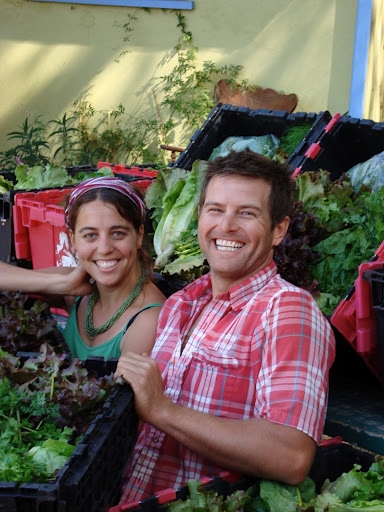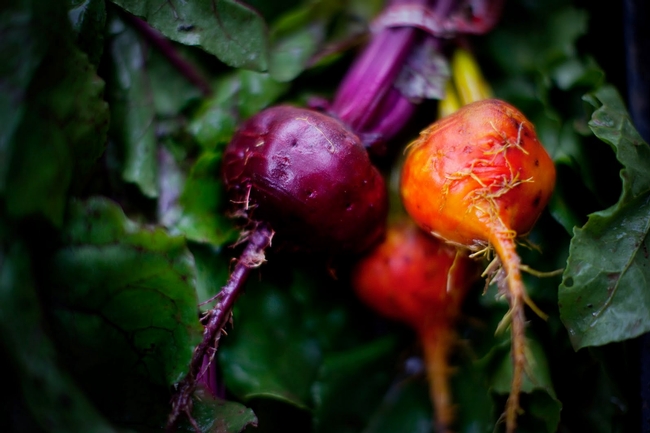With the growing popularity of community supported agriculture has come a proliferation of CSA models, with a wide variety of structure, goals, customer interactions and food products. Two different CSAs offered tips to farmers and workshop participants at the California Small Farm Conference.
On the panel were John Fonteyn and Elizabeth Del Negro, who operate Rio Gozo Farm in Ojai on 3.5 leased acres as the sole employees.
Also on the panel was Sarah Nolan, the CSA coordinator for South Central Farmers Cooperative, which farms 85 acres in Buttonwillow and delivers to locations throughout the Los Angeles basin.

“I think it’s important that we focus on the community aspect of community supported agriculture,” Fonteyn said. “I didn’t want to just put food in boxes and put them in trucks and send them away. I really wanted to live in a community.”
He believes that many CSA member also seek a sense of community and want to be part of building that community themselves. Many of their CSA members volunteer to pack boxes and visit the farm at other times too.
Fonteyn thinks that being likeable as a business person and farmer can go a long way.
“People go to you because they like you,” he said. “It’s really an attachment to us, our goals, our approachability.”
They also make concerted efforts to stay in the public eye.
“We say yes as often as we can,” Del Negro said, listing on-farm dinners, fundraisers, partnering with chefs and entertainers, speaking at events, providing farm tours and cooperating with media members as things they “say yes” to in order to maintain a strong community presence.
Rio Gozo also has an online presence, through a blog, Facebook and Twitter.
“When people search for farms, they want to see beautiful images,” Del Negro said. “When you go on our website, you’ll see deep colors, sharp photos and very few words.”
Retention
Rio Gozo initially offered monthly, seasonal and annual memberships, but have shifted away from offering monthly subscriptions — which has increased their membership retention.

The South Central Farmers Cooperative offers boxes on a one-time basis, in addition to offering monthly and seasonal subscriptions. Though they deliver about 300 boxes per week, they have about 500 customers per year receiving a box at one time or another.
“A lot of your work as a CSA is to throw that broad net out to get more people,” Nolan said. She described a 60 percent attrition rate for CSAs on average as normal.
But, she said, it’s also important to form relationships with customers, so that people who might be inclined to continuing their membership with the CSA do indeed stay on.
Since the South Central Farmers Cooperative also sells at farmers markets, Nolan said they make a point of trying to help customers self-assess whether a CSA is right for them.
“[Consumers] need to figure out — are you a CSA person or a farmers market person?” she said.
Planting
They each offered these general tips about what to grow:
- “Plant as many varieties as possible because CSA members want variety in their boxes, and if you’re not aggregating, then you need to grow it,” Del Negro said.
- “We try to grow as much as possible on our own farm,” Nolan said. “We do partner with other farms and we are very clear with CSA members about who we’re partnering with and what’s going on.”
Regulation
Dave Runsten, of Community Alliance with Family Farmers, spoke up to explain that the California Department of Food and Agriculture is currently working on issues related to direct marketing, including CSAs and how CSAs relate to food safety.
One of the concerns discussed related to food safety for CSAs is controls for “potentially hazardous foods,” which is a regulatory term that can refer to food products that cannot be safely held without temperature controls.
“So the extent that you don’t include potentially hazardous foods in your CSA box, then you won’t be subject to those handling requirements,” Runsten said.
Other concerns related to food safety and CSAs might include the CSA boxes themselves, whether they are cleaned or use a liner, and traceability of product through CSA channels.
Runsten said he maintains an email list of CSA operators in California, as a source for advice and opinions. CAFF is also planning a conference focused on CSAs in January 2013.
Back to the newsletter: Find more Small Farm News articles from our Vol 1. 2012 edition.